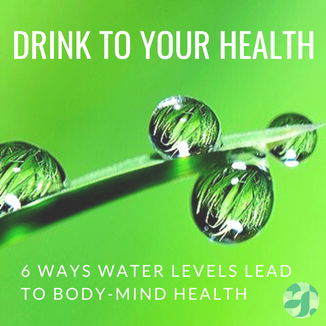|
I was going to post something on sunburn today but this morning I woke up to a gentle rain outside and I changed my mind.
In the winter rainfall region of the Western Cape, in December and in a time when we have severe water restrictions, rain is the ultimate gift for the dry and windswept garden. So rather than writing about sunburn, I decided to celebrate the miracle of water instead. I thought I would share some facts about the role of water in our body-brain-minds.
And a very important role it is.
Our bodies, including our brain, cannot function properly if we are dehydrated. The body is made up of between 70% and 75% water and every system requires water to function effectively. Even our bones contain water. 1. Transportation Our hormones, nutrients and waste material are transported through the body via waterways – blood, plasma, lymph as well as the fluids which surround tissue cells. 2. Blood pressure Up to 92% of plasma is water and plasma constitutes up to 55% of blood volume. Hydration levels influences blood volume which in turn affects blood pressure and heart function. When we sweat a lot, blood volume can decrease causing fluctuations in blood pressure and an increased heart rate. 3. Temperature control It is not that we should avoid sweating at all cost to stabilise blood pressure. Sweating is a critical temperature control process in the body. It cools the body as the sweat evaporates from the skin. If however we have not taken in enough water, the body is unable to cool us down and our core temperature can increase to the point where we start losing electrolytes and blood volume. 4. Digestion Our digestive system requires water to function optimally. The water we take in through liquids and food is absorbed in the gastrointestinal tract or gut as it is commonly called. Most of the water is absorbed in the small intestine, up to 15 Litres a day, with about 5 Litres a day taken up in the colon. Not drinking enough water may lead to constipation. However it is worth noting that drinking more water without supplementing your diet with fibre-rich food will not solve the problem. Children and older people are particularly vulnerable to digestive problems when dehydrated. 5. Moisturise the mind Hydration levels also affect brain and nervous system function. The brain consists of almost 85% water and the entire nervous system depends on fluids to transport neuro-chemicals from one neuron to another. It also delivers nutrients to the brain and removes waste material. Too little water in our system can cause memory dysfunction, the inability to focus our thoughts and brain fog or that feeling of confusion, lack of mental clarity and even feeling outside one’s own body. It affects our sleep and our emotions and thirst can make us irritable, depressed. As the brain does not store water, we have to drink water throughout the day to maintain hydration levels.
6. Soothing the soul
Yes, water is essential for our survival but we also need our psyches to be irrigated. Something as simple as taking a shower or swimming or just watching the rain through the window, is enough to improve my mood. Well, for a while anyway, but being born and bred South African, more than four days of rain and cloudy skies, and I am ready to welcome the sunshine again. Take a shower, wash off the day. Drink a glass of water. Make the room dark. Lie down and close your eyes.
But my joy about the rain in my garden is also a stark reminder that I can just turn open a tap for access to drinking water any time I feel like it.
In my country and all over the world, billions of people do not have that privilege. Let us all treat water with respect. Water is one of the most basic of all needs - we cannot live for more than a few days without it. And yet, most people take water for granted. We waste water needlessly and don't realize that clean water is a very limited resource. - Robert Alan Aurthur The world doesn't stand a chance without water. It spreads disease. Compromises safety. Makes education elusive and economic opportunity farther out of reach. The lack of access to safe water is deadly, dangerous, and a major obstacle to the people of developing nations becoming economically empowered. It is what is standing between billions of people and their health, safety, and the opportunity to unlock their true potential. - water.org
Source: Popkin, B.M., D'Anci, K.E. and Rosenberg, I. H.(2010). Water, Hydration and Health. In Nutrition Reviews 68(8): 439–458.
1 Comment
Leave a Reply. |
Erika KrugerI am Erika Kruger, self-care skills trainer & mentor. I am here for every person who realises that their wellbeing is THEIR business. Categories
All
|




